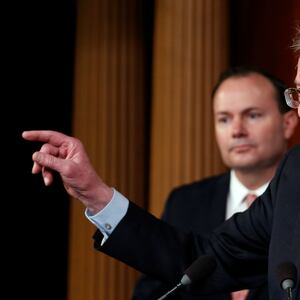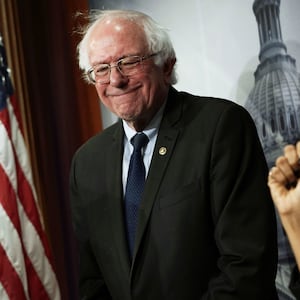Sen. Bernie Sanders (I-VT), the Independent senator from Vermont who launched a surprisingly competitive challenge to Hillary Clinton in the 2016 Democratic primary, is taking another stab at the White House.
The senator, who identifies as a democratic socialist, announced a much-rumored second presidential bid on Tuesday morning in a 1,500-word email that hit many of the major notes he has sounded throughout his decades in public office.
“Our campaign is not only about defeating Donald Trump, the most dangerous president in modern American history. It is not only about winning the Democratic nomination and the general election. Our campaign is about transforming our country and creating a government based on the principles of economic, social, racial and environmental justice,” the letter reads. “Together, you and I and our 2016 campaign began the political revolution. Now, it is time to complete that revolution and implement the vision that we fought for.”
ADVERTISEMENT
There are critical differences between the run Sanders made four years ago—famously announced at a low-attended press conference on Capitol Hill—and the one he’s launching now. In 2016, Sanders was a long-shot challenger to a clear and established frontrunner with few other candidates competing for votes. The contrast he was able to draw with Clinton—both on political and philosophical grounds—helped lay the foundation for a historic grassroots movement and accompanying fundraising apparatus, one that brought him closer to victory than any prognosticator had initially predicted. In all, Sanders won 23 contests to Clinton's 34 and 43.1 percent of the primary vote to her 55.2 percent.
Today, Sanders, who is skipping the exploratory committee phase of the campaign and immediately becoming a candidate, enters a crowded primary field with far less ideological diversity among those in it. The Senator’s opponents agree with him on much of his plank, including job guarantee proposals, free or debt-free college, rejection of PAC money and Medicare for All, a fact he hinted at in his launch letter.
“Three years ago, during our 2016 campaign, when we brought forth our progressive agenda we were told that our ideas were ‘radical’ and ‘extreme.’ We were told that Medicare for All, a $15 an hour minimum wage, free tuition at public colleges and universities, aggressively combating climate change, demanding that the wealthy start paying their fair share of taxes, were all concepts that the American people would never accept,” the letter reads. “Well, three years have come and gone. And, as result of millions of Americans standing up and fighting back, all of these policies and more are now supported by a majority of Americans.”
But while Sanders may no longer be able to claim the mantle of insurgent, he enters the current race with clear advantages. Chief among them is the email list that he built up during the 2016 campaign—likely the largest in progressive politics—which makes him the biggest fundraiser in the current field and will also give him a base of voters and volunteers that he can instantly contact while his competitors lean on retail politics. Sanders’ base of committed supporters includes an estimated 2.1 million online donors and he has consistently polled among the top vote-getters among prospective candidates along with former Vice President Joe Biden.
Sanders will likely be working with a much broader team in order to better compete in states where he was defeated in 2016, including those across the South with higher percentages of African-American voters. He recently spoke in South Carolina on Martin Luther King Jr. Day and met with local leaders and students.
In the lead-up to Sanders’ official announcement, campaign alumni have also engaged in an, at times, painful conversation about instances of sexual harassment and misconduct during the 2016 run. Though it remains unclear who will serve as campaign manager for the Senator’s 2020 campaign, staffers that had been singled out as the bad actors were swiftly dismissed from the second White House bid. There have also been discussions about having a woman serve as campaign manager to replace Jeff Weaver who has been given a different role, and Sanders recently held a meeting with alumni to listen to their concerns and discuss operational improvements.
“To the women in our campaign who were harassed or mistreated I apologize,” he said in a public apology. “Our standards, our procedures, our safeguards were clearly inadequate.”
Despite his popularity with Democratic voters, Sanders still finds himself the subject of skepticism among some in the party, owing largely to his refusal to formally become a member of it. As in 2016, he will run for the Democratic nomination in 2020.
However, Sanders has shored up his standing in other ways. His run in 2016 led the Democratic National Committee to adopt reforms and to pledge to remain neutral throughout the 2020 primary process. Sanders himself has also chalked up a number of successes in the Senate since his initial run, including shepherding a bipartisan resolution to end the United States involvement in Yemen, pressuring Amazon CEO Jeff Bezos to increase the minimum wage for Amazon’s domestic workers and recently introducing an estate tax expansion.
The latter bill exemplifies Sanders’ intense, character-defining focus on the concentration of wealth in the United States. It is a feature he shares with Sen. Elizabeth Warren (D-MA), a Senate colleague and now primary competitor. The two have a personal kinship and reportedly dined in December at which there appeared to be a tacit acknowledgment that they would both end up running.
Sanders, in prior interviews with The Daily Beast and other publications, indicated that he was surveying the field. But instead of choosing to run as a means of moving the field towards his policy positions (as appeared to be the case in 2016) he said he was basing an eventual decision on whether he thought he was the strongest candidate to defeat Trump.
"If there’s somebody else who appears who can, for whatever reason, do a better job than me, I’ll work my ass off to elect him or her," he recently told New York Magazine. "If it turns out that I am the best candidate to beat Donald Trump, then I will probably run.”








